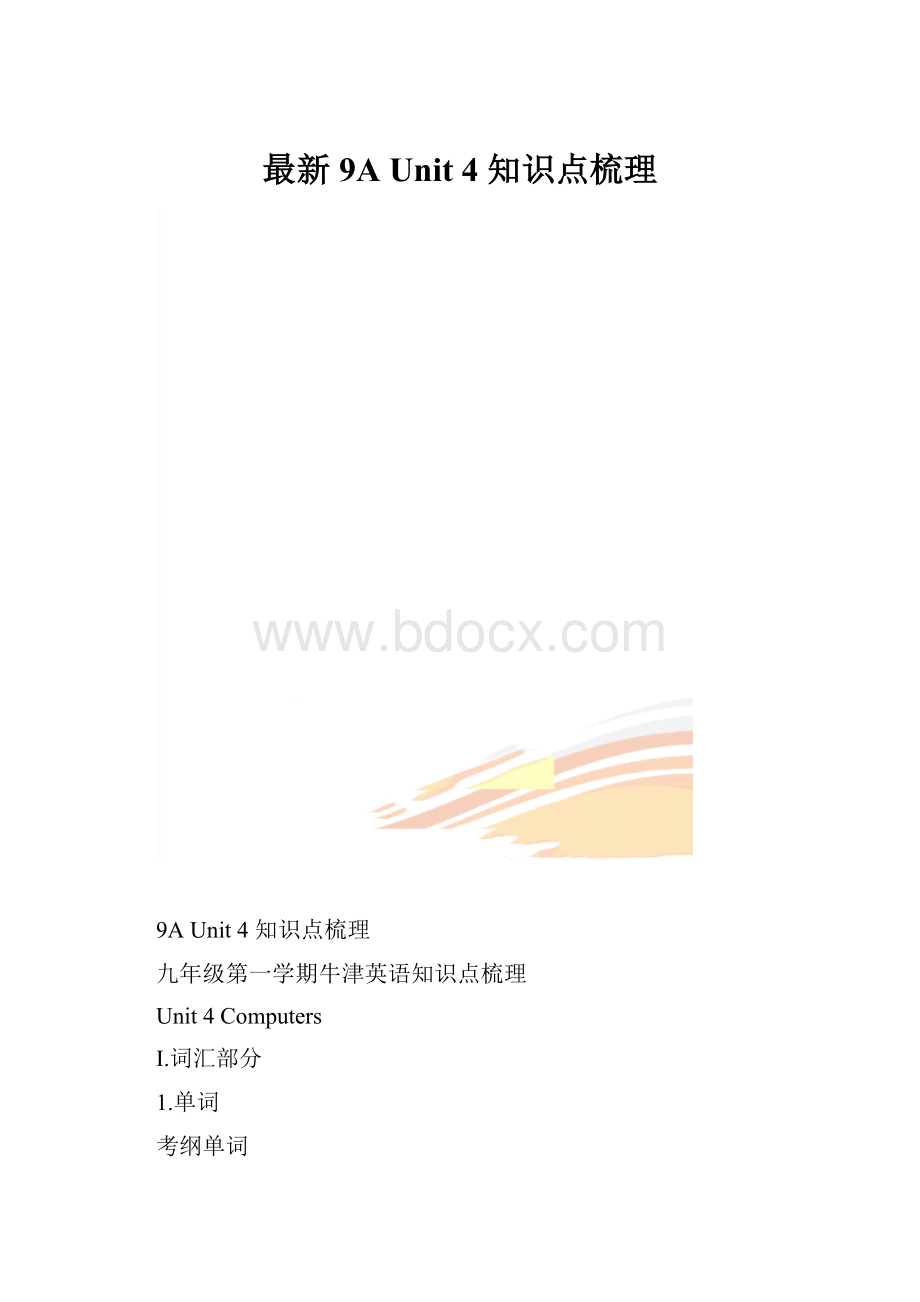最新9A Unit 4 知识点梳理.docx
《最新9A Unit 4 知识点梳理.docx》由会员分享,可在线阅读,更多相关《最新9A Unit 4 知识点梳理.docx(13页珍藏版)》请在冰豆网上搜索。

最新9AUnit4知识点梳理
9AUnit4知识点梳理
九年级第一学期牛津英语知识点梳理
Unit4Computers
I.词汇部分
1.单词
考纲单词
1)screen
[]
n.
屏幕
2)depend
[]
v.
依靠;依赖
3)common
[]
adj.
常见的;普遍的
4)knowledge
[]
n.
知识;学问
5)print
[]
v.
印刷;打印
6)operate
[]
v.
操作;控制;使运行
7)spaceship
[]
n.
宇宙飞船;航天器
8)order
[]
n.&v.
订购
9)length
[]
n.
长度
10)seat
[]
n.
座位
11)distance
[]
n.
距离;间距
非考纲单词
12)*recognize
[]
v.
辨认出;认识
13)*desktop
[]
n.
台式电脑
14)*laptop
[]
n.
便携式电脑
15)*palmtop
[]
n.
掌上电脑
16)*tiny
[]
adj.
极小的;微小的
17)*unaware
[)]
adj.
没意识到;未察觉
18)*rarely
[]
adv.
罕有;很少;不常
19)*importantly
[]
adv.
重要地
20)*aeroplane
[]
n.
飞机
21)*meaning
[]
n.
意义;意思
22)*command
[]
n.
命令;指令
23)*CD-ROM
[]
n.
只读光盘
24)*DVD-ROM
[]
n.
数字只读光盘
25)*writing
[]
n.
文章;著作
26)*aware
[]
adj.
意识到
27)*blank
[]
adj.
空白的
28)*supply
[]
n.
贮备;供应量
29)*contact
[]
n.
联系人
30)*reference
[]
n.
编号;参考
31)*quantity
[]
n.
数量
32)*peak
[]
n.
山顶;山峰
33)*court
[]
n.
公寓大楼
2.词组
考纲词组
1)dependon
依靠;依赖
2)forthetimebeing
暂时;眼下
3)so…that
如此……以至于……
4)playwith
玩耍,摆弄
5)beableto
能够(有能力)
6)forexample
例如
7)talkto
与……谈话
8)listento
听……
非考纲词组
9)*(be)unawareof
没意识到;未察觉
10)*commonknowledge
常识
11)*besmallenoughtoputinyourpockets
足够小放进你的口袋
12)*likeabarofchocolate
像一块巧克力
13)*operaterailways
运行铁路
14)*flyareoplanesandspaceships
开飞机和飞船
15)*callthemelectronicbrains
称它们为电脑
16)*theanswertothisquestion
这个问题的答案
17)*createnewideas
产生新想法
18)*raisesomeinterestingquestions
提出一些有趣的问题
19)*changeourlives
改变我们的生活
20)*helpyourecognizeyourvoice
帮助你识别你的声音
21)*obeyyourcommands
遵循你的指令
22)*writeyourletters
写你的信
23)*holdmillionsofpagesofwriting
容纳成千上万页文章
24)*readabout
读到;查阅到
25)*sincethen
自此以后
3.英英解释
考纲词汇
1)obey
v.
followacommandororder
服从;听从;顺从
2)operate
v.
useorcontrolamachine
操作;控制;使运行
3)type
v.
writeusingakeyboardoftypewriter
打字
4)realize
v.
becomeaware
意识到
5)raise
v.
putforward
提出
6)dependon
need
依靠;依赖
7)forthetimebeing
fornowandsometimeintothefuture;
atpresent
暂时;眼下
非考纲词汇
8)*command
n.
orderorinstruction
命令;指令
9)*desktop
n.
afull-sizedcomputerwithaseparatemonitorandkeyboard
台式电脑
10)*laptop
n.
asmallcomputerthatyoucancarryaroundeasily
便携式电脑
11)*rarely
adv.
notoften;seldom
罕有;很少;不常
12)*recognize
v.
knowandidentify
辨认出;认识
13)*super
adj.
excellent
优秀的;极好的
14)*tiny
adj.
verysmall
极小的;微小的
15)*program
n.
asetofinstructionswhichcanmakeacomputerwork
程序
16)*commonknowledge
somethingknownbymostpeople
常识
17)*unawareof
notknowingabout
没意识到;未察觉
II.重点难点
1.重点词汇
考纲词汇
1)knowledgen.知识
know(knew,known)v.了解;知道;认识
2)calculatorn.计算器
calculatev.计算
3)importantlyadv.重要地
importantadj.重要的importancen.重要性
4)meaningn.意思
mean(meant,meant)v.意味着;意思是;表示……的意思
5)ableadj.能够的;有能力的
unableadj.无能的enablev.使......能够abilityn.能力;才能
6)interestingadj.有趣的
interestedadj.感兴趣的interestn.兴趣;趣味
7)lifen.生命
livespl.
8)writev.写
writern.作家writingn.文章;著作
非考纲词汇
9)unawareadj.没意识到;未察觉
awareadj.意识到;察觉
●(be)unawareof/(be)awareof没意识到;未察觉/意识到;察觉
10)probablyadv.可能地
probableadj.可能的
11)rarelyadv.罕有;很少;不常
rareadj.罕有的
2.重点句型
1)Sincethencomputershavebecomesmallerandsmaller..
►连系动词be,become,get,turn,look,feel,sound,smell,taste,seem…+adj.
e.g.Itwillgethotterthissummer.
Themooncaketastestoosweet.
★学生易将其当行为动词,后跟副词,可尝试变为词组来识记,并配以练习反复操练。
2)Theyaresmallenoughtoputinyourpocketlikeabarofchocolate.
►adj./adv.+enough+n.足够
e.g.Theboyisnotoldenoughtodrivethecar.
Wehaveenoughtimetofinishourhomework.
★学生易将形容词和名词与enough的位置搞错,可尝试用举例或比较等方法区分。
3)Otherkindsofcomputersaresotinythatyoumaybeunawareofthem.
►so…that…+否定句=too…to…如此……以至于…;太…不…
so…that…+肯定句=adj./adv.+enough(forsb.)to…
e.g.Heissoyoungthathecan’tgotoschool.他不够年龄上学。
=Heistooyoungtogotoschool.
=Heisnotoldenoughtogotoschool.
★学生在句型转换中易用错too…to…和adj./adv.+enough(forsb.)to…,提醒学生先读懂句意,再判断用何种结构。
4)Whatkindofjobscanacomputerdo?
►问种类用whatkindof提问
e.g.Whatkindoffilmsdoyouliketowatch?
★提醒学生注意whatkindof跟可数名词复数。
5)Itisacommonknowledgethatcomputersaresupercalculators.
►Itisacommonknowledgethat…=Asweallknow,众所周知
★提醒学生后跟句子,并注意单词拼写。
6)However,onedaycomputersmaybeabletodomostthingsthatahumanbraincandoandevendothembetter.
►beableto能够(有能力)
★帮助学生通过举例和比较的方法区别beableto与can的用法:
1beableto强调通过努力而获得的能力,而can则强调自身已具有的能力。
e.g.ShecansingthesonginEnglish.她能用英语唱这首歌。
HewillbeabletosingthissonginEnglishinafewminutestoo.几小时之后,他也能用英语唱这首歌。
②beableto各种时态均有;而can只有一般现在和一般过去两种时态。
e.g.Icouldhelpyoulastnight,butyoudidn’tcome.昨天晚上我能帮你,而你又没来。
Canyouseeitthere?
你能看见它在那儿吗?
Heis/was/willbeabletohelpyou.他能帮你的忙。
③can可用于表示可能性,推测,允许等情况,而beableto通常不这样用。
7)Forexample,theymaybebetterthandoctorsatdoingtheirjob.
►begood/pooratdoingsth.擅长/不擅长做某事
e.g.Heisgoodatsinging.
Sheispooratswimming.
★学生易用错介词at,或不用动词-ing形式,可尝试变为词组来识记。
8)Whatwillhappenifcomputerscandoourjobs?
►if引导条件状语从句,主句用一般将来时,从句则用一般现在时。
e.g.Ifitdoesn’traintomorrow,wewillgototheparktohaveapicnic.
★学生易用错时态,识记口诀“主将从现”,并配以练习反复操练
9)Computersmaychangeourlives,butwilltheymakethembetter?
►makesb./sth.+adj.比较极使……更……
e.g.Let’stryourbesttomakeourcitybetter.
★学生易用错该结构,尝试通过举例和操练帮助其掌握用法。
10)ADVD-ROMcanholdmillionsofpagesofwriting,andcanalsocontainpictures,videosandsounds.
►hundred/thousand/million前无具体数字后加s和of,前有具体数字则不加。
e.g.Hundredsofstudentswillgoabroadtofurthertheirstudies.
Twothousandpeoplewatchedtheshow.
★学生易多加或漏加s和of,提醒学生看清前是否有具体数字。
11)Forexample,youcanuseyourcomputertoreadaboutafamouspersonfromhistory.
►usesth.todosth.=usesth.fordoingsth.用某物做某事
sth.beusedtodosth.=sth.beusedfordoingsth.某物被用来做某事
e.g.Youcanuseadictionarytolookupnewwords.=Youcanuseadictionaryforlookingupnewwords.
Adictionarycanbeusedtolookupnewwords.=Adictionarycanbeusedforlookingupnewwords.
★帮助学生通过举例和操练掌握结构间的转换,注意动词的变化。
3.语法:
Comparisonofadjectives/adverbs形容词、副词的比较级和最高级
1)形容词、副词的比较级和最高级的构成规则
①一般单音节词和双音节词,比较级在原级后面加-er,最高级在后面加-est
e.g.small→smaller→smallest;short→shorter→shortest
clever→cleverer→cleverest;narrow→narrower→narrowest
②以不发音e结尾的单音节词,比较在原级后加-r,最高级在原级后加-st;
e.g.large→larger→largest;nice→nicer→nicest
③在重读闭音节(即:
辅音+元音+辅音)中,先双写末尾的辅音字母,比较级加-er,最高级加-est;
e.g.big→bigger→biggest;hot→hotter→hottest;fat→fatter→fattest
④以“辅音字母+y”结尾的双音节词,把y改为i,比较级加-er,最高级加-est;
e.g.easy→easier→easiest;heavy→heavier→heaviest;
busy→busier→busiest;happy→happier→happiest
⑤一般多音节词,比较级在前面加more,最高级在前面加most;
e.g.beautiful→morebeautiful→mostbeautiful;different→moredifferent→mostdifferent
2)形容词、副词的比较级的用法:
主要用来表示二者人或事物的比较,表示“更……”的意思。
①“A+be+比较级+than+B”意思为“A比B更……”。
e.g.Thistreeistallerthanthatone.这棵树比那棵树高。
②“比较级+and+比较级”或“moreandmore+原级”表示“越来越……”
e.g.Itbecomeswarmerandwarmerwhenspringcomes.
Thewindbecamemoreandmoreheavily.
③在含有or的选择疑问句中,如果有两者供选择,前面的形容词要用比较级形式。
e.g.Whoistaller,TimorTom?
④“the+比较级……,the+比较级”,表示“越……越……”。
e.g.Themoremoneyyoumake,themoreyouspend.
Thesooner,thebetter.
⑤可修饰比较级的词有abit,alittle,rather,much,far,alot,any,still,even等。
⑥为了避免重复,在从句中常用one,that,those等词来代替前面提过的名词。
e.g.TheweatherhereiswarmerthanthatofShanghai.
Theradiosmadeinourfactoryarebetterthanthoseinyourfactory.
3)形容词、副词的最高级的用法:
主要用来表示三者或三者以上人或事物的比较,表示“最……”的意思。
①句子中有表示范围的词或短语。
如:
ofthethree,inourclass等等。
e.g.Heisthetallestinourclass.
②序数词修饰最高级。
e.g.Africaisthesecondlargestcontinent.
4)形容词、副词的原级的用法
①两者相比(A=B),用“as+原级+as”表示
e.g.TomisastallasMike.
②两者相比(Ae.g.Ididn’tdomyhomeworkas(so)carefullyasyou.
Thepictureislessattractivethanthatone.
★强调学生注意易错处
1)少数形容词、副词的比较级和最高级是不规则的,要求学生熟记。
e.g.good/well→better→best;bad/ill→worse→worst
old→older/elder→oldest/eldest
many/much→more→most;little→less→least
far→further/farther→furthest/farthest
2)提醒学生避免重复使用比较级。
e.g.(错)Heismoreclevererthanhisbrother.
(对)Heisclevererthanhisbrother.
3)very,quite一般只能修饰原级,不能修饰比较级。
e.g.(错)Thebookisverynicer.
(对)Thebookisverynice.
(对)Thebookisnicer.
4)形容词、副词的比较级与最高级的转换:
e.g.Mikeisthemostintelligentinhisclass.
(错)Mikeismoreintelligentthananyotherstudentsinhisclass.
(对)Mikeismoreintelligentthananyotherstudentinhisclass.